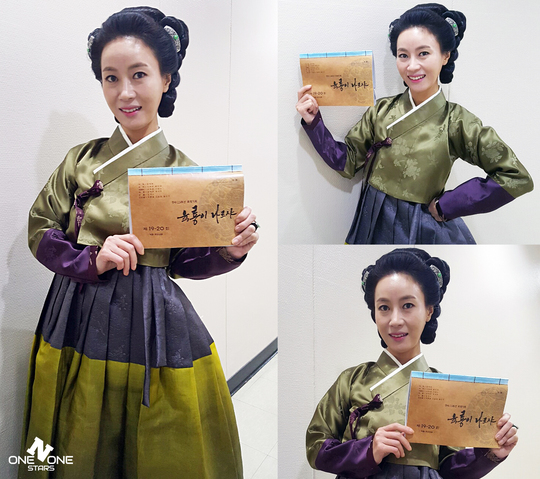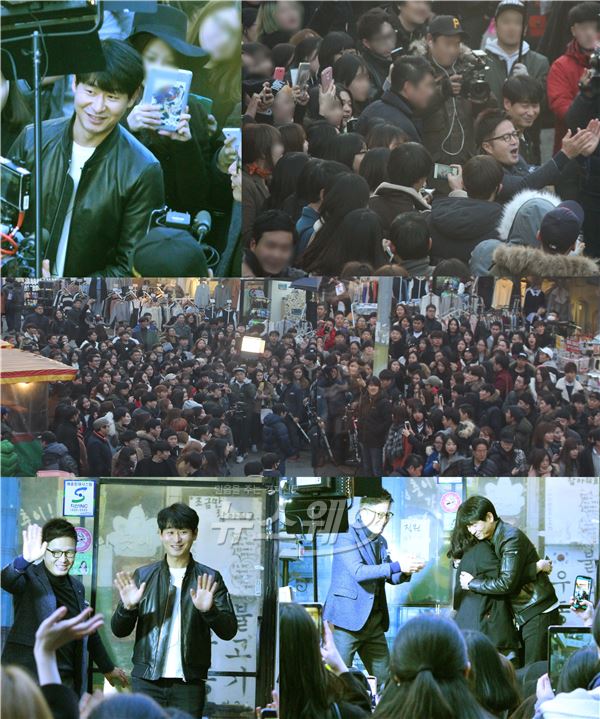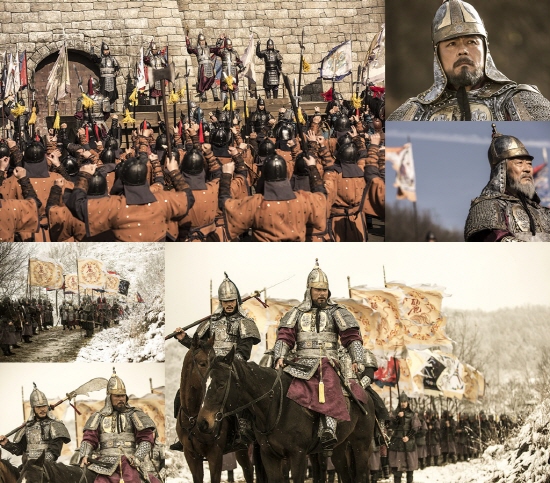|
|
[SBS]~ Six Flying Dragons~ Yoo Ah In, Shin Se Kyung, Kim Myung Min (Part 2)
 [Copy link]
[Copy link]
|
|
|
dah habis tengok ep18...
LIG tu terer betul..true politician..pandai baca..
group misteri muncul balik!! misteri betullah..
|
|
|
|
|
|
|
|
|
|
|
|
mcm sesuai je..good chemistry..
|
This post contains more resources
You have to Login for download or view attachment(s). No Account? Register
x
|
|
|
|
|
|
|
|
|
|
|
mmg LIG akan jd saingan hebat le kan utk Gen Lee...
ni nti akan jd makin sengit....sbb dia mmg politician..
bertemu dgn panglima perang...
|
|
|
|
|
|
|
|
|
|
|
|

Tree with Deep Roots - Episode 2Yi Do (King Sejong) : I thought you had different vision from Jung Do-Jeon who established the foundations of Joseon. I thought it was for the sake of creating a new Joseon that is different from his vision. However, I was mistaken. Father, the reason you have killed him was simply because you want to seize power only by yourself. And… and… The Joseon that Jung Do-Jeon has created was all credited to you.
Yi Bang-Won (King Taejong) : That man did nothing! I put Jung Mong-Joo to death (ada dlm cite The Great Seer). I went to Ming China as a hostage in his place, I overthrew the king of Goryeo and established my father as the king. Even if there were many who wanted to kill Jung Mong-Joo, they couldn’t do it due to their excuse of moral duty. They wouldn’t dare to dirty their own hands. Joseon has been resurrected by me. I have done it by dirtying my own two hands. It is only right that I have all the power. That is my Joseon and my, Yi Bang-Won’s, great cause! My great cause is the Joseon’s great cause!
Yi Do : My Joseon is different! It will change!
@WeAiNe @ismaha @nohas
|
|
|
|
|
|
|
|
|
|
|
|
Six Flying Dragons - Ep. 17~18
The historical background to help understand Ep. 17~18* Dodang Triumvirate They really existed in the history, but the scriptwriters intentionally changed their names for artistic license. - Yi In-Im (이인임, 李仁任) → Yi In-Gyeom (이인겸) - watak Yi In Imm ada dlm cite The Great Seer
- Yim Gyeon-Mi (임견미, 林堅味) → Gil Tae-Mi (길태미)
- Ji Yoon (지윤, 池奫) → Baek Yoon (백윤)
- Yeom Heung-bang (염흥방, 廉興邦) → Hong In-Bang (홍인방)
Fact Check
- There is no historical record that the original Gil Tae-Mi was Goryeo’s top swordsman or he liked fancy makeup. In the history, he was just a military officer who got a promotion by protecting King Gongmin during Red Turban invasions as well as engaging in warfare with various foreign invaders.
- It is true that he was original Yi In-Gyeom’s subordinate. Also, original Hong In-Bang was his in-law.
- The original Hong In-Bang was a reformist Sadaebu scholar in the beginning, but turned coat after returning from his exile. His worst-fated relationship with Bang-Won is pure fiction.
- The original Gil and Hong greedily plundered people’s land, so they were at odds with General Choi Young. They tried to eliminate the old general but original Yi In-Gyeom stopped them.
- Their fall was caused by the fabrication of Jo Ban’s rebellion. Choi Young and Yi Seong-Gye joined forces to oust them.
- When being executed, they cursed original Yi In-Gyeom for having stopped them to kill Choi Young in the past.
- At that time, original Yi In-Gyeom was already retired from politics because of his old age. He avoided execution and was sent into exile, but died from disease a few months later.
- Bang-Won’s attempt to get Haedong Gapjok’s signatures to impeach the Dodang Triumvirate is fiction.
|
|
|
|
|
|
|
|
|
|
|
|
Six Flying Dragons - Ep. 17~18
The historical background to help understand Ep. 17~18
* The various names referring to Korea Finally, in Ep. 18, Yi Bang-Ji became the new top swordsman of Three Hans(삼한제일검, 三韓第一劍). Then, what does Three Hans (Samhan) mean? There are various names to refer to Korea. Some of them were derived from ancient kingdoms and dynasties. - Samhan 삼한 三韓 / Three Hans
- Daehan 대한 大韓 / The Great Han
- Haedong 해동 海東 / The East of the Sea
- Dongguk 동국 東國 / The East Country
- Daedong 대동 大東 / The Great East
- Geunyeok 근역 槿域 / The Land of Rose-of-Sharon
- Goryeo 고려 高麗 / The Medieval kingdom of Korea (918~1392)
- Joseon 조선 朝鮮 / The first Ancient kingdom of Korea (BC 2333~BC 108), The Medieval kingdom of Korea (AD 1392~1910)
Sam-han 삼한 三韓 / Three Hans Sam (三) means ‘three’, and Han (韓) means 'an ancient kingdom of Korea’.
This name was originated from Three kingdom period of Korea. After the first kingdom of Korea (ancient Joseon, BC 2333~ BC 108) was fallen, the southern part of Korean peninsula was divided into three small kingdoms :Mahan, Jinhan, Byeonhan (馬韓, 辰韓, 弁韓). Later they were developed intoGoguryeo, Baekje, Silla (高句麗, 百濟, 新羅), which were unified by Silla in 668. But about 300 years later, Silla was divided into three kingdoms again :Hu-Goguryeo, Hu-Baekje, and Silla (後高句麗, 後百濟, 新羅). Even if the later three kingdoms were completely unified by Goryeo in 938, the name “Samhan (Three Hans)” still remained strongly in the people’s mind and had been widely used to call the entire Korean peninsula for a long time. So, Korea is called Samhan (Three Hans) in an old-fashioned way. Dae-han 대한 大韓 / The Great Han
It was originated from Samhan. The current official country name of South Korea is Dae-Han Min-guk (대한민국 大韓民國 : The republic of Korea). In short, Han-guk (한국 韓國). Hae-dong 해동 海東 / The East of the Sea
Dong-guk 동국 東國 / The East Country
Dae-dong 대동 大東 / The Great East
From the Chinese perspective, Korea is located in the East side of the Yellow Sea. That’ why Korea was called in Chinese characters like that.
ex) Haedong Gapjok : The top nobility of Haedong (Korea) Geun-yeok 근역 槿域 / The Land of Rose-of-Sharon
The Rose of Sharon (hibiscus) is the national flower of Korea. Goryeo (高麗) / The Medieval kingdom of Korea (918~1392)
Go (高) means 'High’ and Ryeo (麗) means 'beautiful’.
It also has the meaning that it is the successor state of Go-gu-ryeo (高句麗), one of the three kingdoms in Korea.
General Wang Geon (왕건, 王建) revolted against King Gung-Ye of Hu-Goguryeo and founded Goryeo Dynasty in 918. It unified the later three kingdoms in 936.
The English name of 'Korea’ was originated from this Goryeo. This name got to be known to the West by Arabian merchants who frequently visited Goryeo. Joseon 조선 朝鮮
Jo (朝) means 'morning’, and Seon (鮮) means 'bright, beautiful, clean, fresh, new’ etc. In combination, “The Land of Morning Calm” or “The Land of Bright Morning Sun”.
It is the name of the first Ancient kingdom of Korea (BC 2333~BC 108), as well as the Medieval kingdom founded by Yi Seong-Gye (AD 1392~1910).
|
|
|
|
|
|
|
|
|
|
|
|
Six Flying Dragons - Ep. 17~18
The historical background to help understand Ep. 17~18
* Mokja will get the new nation : 목자득국 (木子得國) Lady Min’s paper read “易姓革命 木子得國”
It means “There will be a Dynastic Revolution, and Mokja (木子) will get the nation." In this case, Mokja (木子) means Yi (李 = 木 + 子). In the history, "Mokja will get the nation (목자득국, 木子得國)” was a children’s song spreading all over Goryeo when General Yi Seong-Gye’s military coup happened. At that time, children’s song or entertainer’s performance was a common way to form public opinion, like we’ve seen in “Who’s Baek Yoon’s murderer?” song in ep. 9. Maybe, it was Yi family who spread the song in order to draw positive public opinion on their new dynasty. Anyway, I researched the song on the web, and found out an interesting interpretation of Mokja (木子). 1) In Chinese : Mok (木, wood) + Ja (子, child) = Yi (李)
As you already know, it can be interpreted as “Yi Family gets the nation.” which implies that Yi family will be the owner of the new Joseon dynasty. 2) In native Korean : Namu (木, wood) + Ai (子, child) = Other’s child
However, it can be interpreted differently in native Korean. “Namu Ai” has double meaning ; 1) wood child (나무 아이) 2) other’s child (남의 아이).
It can be interpreted as “Other’s child got the nation.” which implies “The child who is not King Gongmin’s real son stole Goryeo’s throne.” That is to say, the song is questioning the legitimacy of King U, the current puppet king of Goryeo. Actually, King U’s real mother was a slave girl named Banya who waited upon prime minister Shindon. According to a folk tale, King Gongmin was so depressed after losing his beloved wife Princess Noguk due to childbirth that Shindon offered the king his slave girl Banya who resembled the dead princess. When she gave birth to a son Monino, King Gongmin was so pleased that he fabricated the boy’s birth record as the son of royal concubine Lady Han, not of the slave girl Banya, and installed him as his successor. In 1371, Shindon was executed for treason by false charges. About 3 years later, King Gongmin was assassinated by his royal guard Hong Ryun, and Yi In-Im (Yi In-Gyeom) enthroned the 11-year-old Monino (King U) despite of Queen dowager’s objection. Later on, Yi Seong-Gye’s political party insisted that King U is not of royal blood, but the son of dead traitor Shindon, in order to justify the Dynastic Revolution. Therefore, “Mokja (Other’s child) got the nation” song might have the intention to damage the legitimacy of King U, and also his son King Chang. I’m not sure whether King U is really King Gongmin’s son or not. The only truth is that the defamation worked very well.
|
|
|
|
|
|
|
|
|
|
|
|
Six Flying Dragons - Ep. 17~18
The historical background to help understand Ep. 17~18

* The rebellion of Heungwangsa temple (1363) According to Jung Do-Jeon’s comment in ep 17, Gil Tae-Mi is so famous for killing over 70 people by himself at the rebellion of Heungwangsa temple in 1363. That’s why nobody dares to touch Gil Tae-Mi and let him take Hong In-Bang so easily. Jung Do-Jeon also said they would need as many soldiers as possible to catch Gil Tae-Mi. In March 1363, Traitor Kim Yong sent about 50 assassins to kill King Gongmin, but Eunuch An Do-Chi, Princess Noguk, and General Choi Young stopped the assassination attempt. This incident was mentioned in Jung Do-Jeon’s comment about Traitor Kim Yong who betrayed and killed Goryeo’s 4 war heroes of the Red Turban invasions. (Ep. 10) The scriptwriters implies that Gil Tae-Mi was the one who stopped the 70 assassins at the temple, but it’s not historically true. It’s a fictional addition.
* Jo Min-Soo (조민수, 曺敏修, ?~1390) The man who secretly talked with Yi In-Gyeom and arrested Hong In-Bang at the riverbank is Jo Min-Soo. I’m sure he will be the future enemy of our six dragons. He gained his reputation as a general by defeating the Red Turbans and Japanese pirates. It was Yi In-Im (Yi In-Gyeom) who recommended him for a military officer in the beginning. He also gained Choi Young’s trust. However, he joined Yi Seong-Gye’s military coup when they withdrew their troops at Wihwa island in 1388. He helped Yi Seong-Gye to oust Choi Young and depose King U. He promised to enthrone other royal, but he betrayed Yi Seong-Gye and enthroned Wang Chang, the deposed king’s son who is also Yi In-Im (Yi In-Gyeom)’s distant relative. The rest of the story will be shown in the drama.
|
|
|
|
|
|
|
|
|
|
|
|
Six Flying Dragons - Ep. 17~18
The historical background to help understand Ep. 17~18

* Mencius and Human nature When being asked about the true reason why he turned coat, Hong In-Banganswered Jung Do-Jeon like this : “Because Mencius was wrong.”
When I say that all men have a mind which cannot bear to see the sufferings of others, my meaning may be illustrated thus:– even now-a-days, if men suddenly see a child about to fall into a well, they will without exception experience a feeling of alarm and distress. They will feel so, not as a ground on which they may gain the favour of the child’s parents, nor as a ground on which they may seek the praise of their neighbours and friends, nor from a dislike to the reputation of having been unmoved by such a thing.
'From this case we may perceive that the feeling of commiseration is essential to man, that the feeling of shame and dislike is essential to man, that the feeling of modesty and complaisance is essential to man, and that the feeling of approving and disapproving is essential to man. https://en.wikipedia.org/wiki/Mencius
Mencius asserted the innate goodness of the individual, believing that it was society’s influence – its lack of a positive cultivating influence – that caused bad moral character. “He who exerts his mind to the utmost knows his nature” and “the way of learning is none other than finding the lost mind.”
However, Hong In-Bang asserted that a human being can throw a child into a well for his own benefit. Human nature is so inclined towards selfishness that it is inevitable for human societies to fall into chaos. Goryeo is hopeless. If he can’t change the chaos, he had no choice but to be the part of the chaos.
|
|
|
|
|
|
|
|
|
|
|
|
Six Flying Dragons - Ep. 17~18
The historical background to help understand Ep. 17~18
* Samsa (삼사, 三司) Jung Do-Jeon agreed with Hong In-Bang’s thought on human nature, and came up with a new political system to mutually check and balance the power by taking advantage of Sadaebu’s innate envy and jealousy. The system calledSamsa (삼사, 三司) in the future was similar to the separation of three powers in modern democracy. - Saheonbu 사헌부 司憲府 : Inspecting and impeaching corrupt ministers
- Saganwon 사간원 司諫院 : Criticizing King’s politics and giving him expostulations
- Hongmungwan 홍문관 弘文館 : Providing the king with academic advice, training crown prince, managing palace library’s books, etc.
For example, if Minister Kim was revealed to accept bribes
1. Confucian scholars submit a joint petition to the king.
2. Saheonbu inspects the case and impeaches Minister Kim.
3. If the king refuses the impeachment
4. Saganwon criticizes the king and nags him to do what he should do.
5. Meanwhile, Hongmungwan provides appropriate historical evidence from books to help justify the king’s claim. Just like this kind of process. Jung Do-Jeon made a political system to have the Sadaebu officials and the king fight one another for their own interests. Therefore, political powers are subject to appropriate checks and restraint through mutual oversight. Theoretically, it was quite reasonable system indeed. If applied appropriately, it would check and balance the political power and prevent corruption of government.
However, Jung Do-Jeon can’t predict that it would be abused in the purge of literati or that it would be emasculated if one noble clan dominates the whole 3 departments. Actually, in the 19th century, Joseon met the political dark ages due to the monopoly of government posts by Andong Kim clan, which resulted in the collapse of Joseon Dynasty. (sigh)
|
Rate
-
1
View Rating Log
-
|
|
|
|
|
|
|
|
|
|
|
|
baru nak layan ep 18..sian kan kelewatan kali ini |
|
|
|
|
|
|
|
|
|
|
|
ohsemnya beginning of the ep
scene masa berlawan antara GTM dgn BJ ni memang daebak
sangat cantik cinematograpy dia (betul ke aku eja ni hahaha)
|
|
|
|
|
|
|
|
|
|
|
|
Lady Gang (Queen Shindeok ; Yi Seong-Gye's second wife)

|
|
|
|
|
|
|
|
|
|
|
|

Gil Tae-Mi in Hongdae street, Seoul (SBS Midnight TV Entertainment)
|
|
|
|
|
|
|
|
|
|
|
|

Yi Seong-Gye's Military withdrawl at Wihwa island (1388). Maybe ep 20 or 21
When a Ming Chinese messenger came to Goryeo in 1388 (the 14th year of King U) to demand the return of a significant portion of Goryeo’s northern territory, General Choi Young seized the opportunity and played upon the prevailing anti-Ming atmosphere to argue for the invasion of the Liaodong Peninsula (Goryeo claimed to be the successor of the ancient kingdom of Goguryeo; as such, restoring Manchuria as part of Korean territory was a tenet of its foreign policy throughout its history). A staunchly opposed Yi Seong-Gye was chosen to lead the invasion; however, at Wihwa Island on the Yalu River, he made a momentous decision, commonly called "Turning back the army from Wihwa Island", that would alter the course of Korean history. Knowing of the support he enjoyed both from high-ranking government officials, the general populace, and the great deterrent of Ming Empire under the Hongwu Emperor, he decided to revolt and swept back to the capital, Gaesong, to secure control of the government.
|
|
|
|
|
|
|
|
|
|
|
|
'Six Flying Dragons' star Park Hyeok-kwon's two faces, Kil Tae-mi vs Gil Seon-mi

|
|
|
|
|
|
|
|
|
|
|
|

@WeAiNe @makdik2301 @idakamaruddin
|
|
|
|
|
|
|
|
|
|
| |
|